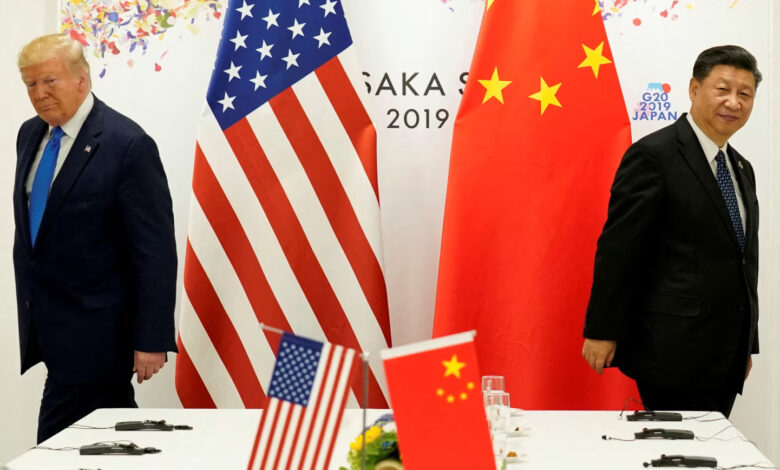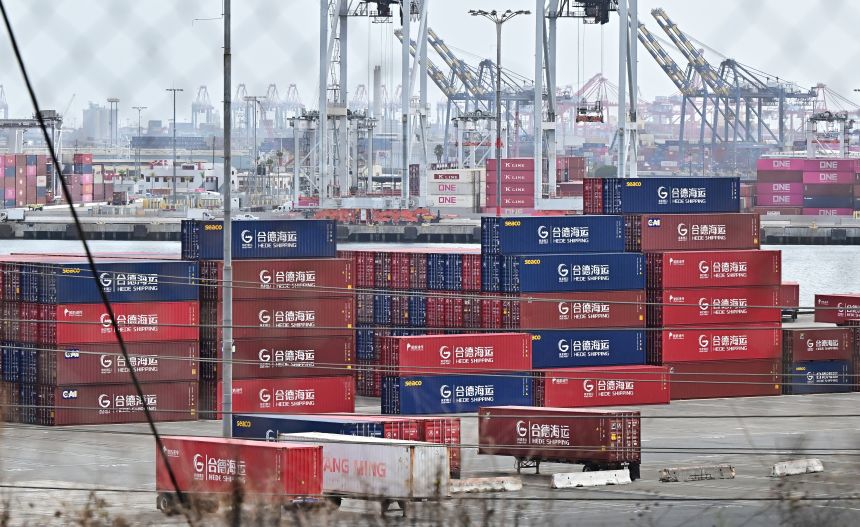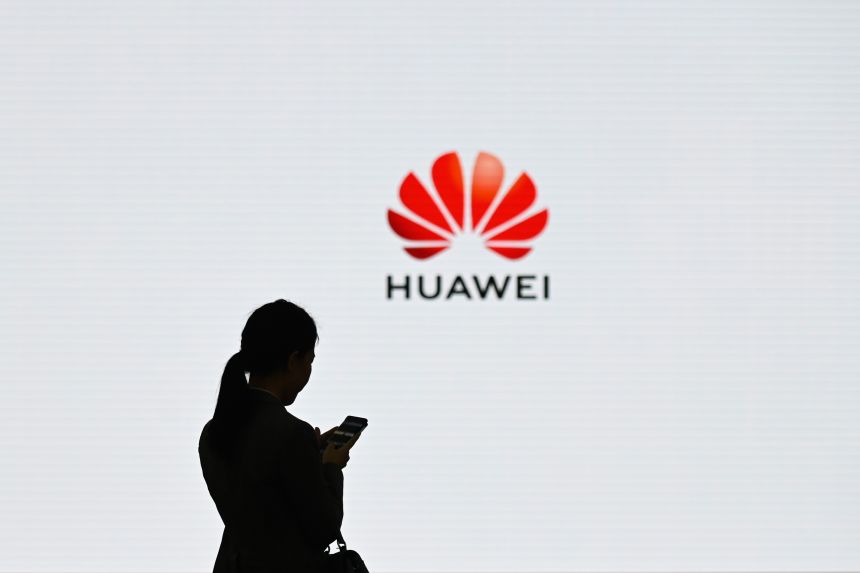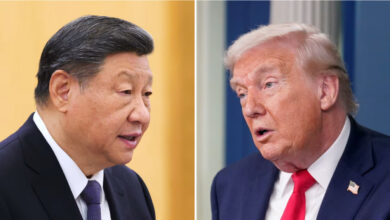
President Donald Trump expressed shock at China’s “surprising” move to unleash sweeping export controls on rare earths, accusing the country of “becoming very hostile.”
But according to Beijing, it was Washington’s expansion of curbs on Chinese firms that ratcheted up tensions and drove it to further tighten its grip on the critical minerals essential in the production of a wide range of electronics, automobiles and semiconductors.
In a rapid escalation of friction over the weekend, Trump said he would restore tariffs on China to triple-digit levels due to Beijing’s new controls, prompting the Chinese government to vow “corresponding measures.”
The moves between the world’s two largest economies have rattled markets, unnerved global industries of production shocks, and rekindled fears of a repeat of the tit-for-tat tariff offense in spring, when levies on Chinese and American imports reached levels tantamount to trade embargoes.
The renewed tensions also risk derailing the progress made during months of trade negotiations and raised questions about whether a planned meeting between Chinese leader Xi Jinping and Trump in South Korea at the end of the month will still take place.
After Trump suggested that he might call off the meeting, Treasury Secretary Scott Bessent told Fox News Monday he still expected it to happen.
China’s commerce ministry said Tuesday it remained open to talks, while reiterating that the US cannot seek dialogue while threatening new measures.
For Beijing, much of the current escalation could have been avoided had the Trump administration not piled on more restrictions in late September, massively increasing the number of Chinese entities on its export control list, Chinese experts and analysts said.
Jin Canrong, a professor of international relations at Renmin University in Beijing and a government adviser, said Beijing had merely responded to Washington’s series of “petty manoeuvres.”
“After taking a bite at China, the US now pretends to be innocent and even tries to play the victim,” he wrote in a Saturday post on Chinese social media Weibo.
From easing to escalation
Over the summer, US-China relations had shown signs of a detente, particularly following trade talks in Madrid in September and a subsequent phone call between Xi and Trump, according to Wu Xinbo, dean of the Institute of International Studies at Fudan University in Shanghai and an advisor to the Chinese foreign ministry.
In the September call with Trump, Xi commented positively on the talks, but also warned the American president against “imposing unilateral trade restrictions to undermine the progress achieved by both sides.”
But Washington significantly expanded its export restrictions just 10 days after the call by placing the subsidiaries of already sanctioned companies from China and elsewhere under the same controls, increasing the number of firms facing the curbs in China from around 3,000 to several thousand more.

“From China’s perspective, this is extremely malicious,” Wu said, adding that it again shows Trump “acting in bad faith.”
“If, after more than half a year of dealing with China, the US still hasn’t realized that taking such actions against China will have serious consequences, then I’d say the people on Trump’s team are downright incompetent,” he said.
China’s commerce ministry echoed this sentiment on Sunday, citing additional examples such as US plans to charge fees on Chinese-built ships docking at American ports.
These US actions “have seriously harmed China’s interests and undermined the atmosphere of bilateral economic and trade talks,” the ministry said, urging Washington to “preserve the hard-won progress,” while vowing countermeasures should Trump make good on his latest threat.
Deja Vu
Paul Triolo, a China and tech expert at consulting firm Albright Stonebridge, said the escalation harkens to the downward spiral of bilateral relations in May.
“We’re sort of at the edge of an abyss again,” Triolo said. “But now the stakes are even higher because both sides now understand the consequences of this.”
Following a trade truce in which the two countries agreed to dramatically roll back steep tariffs through talks in Geneva, Trump dropped a series of bombshells.
He banned global companies from using Chinese tech giant Huawei’s AI chips, implemented new export curbs on chip designing software aimed at China, and threatened to revoke Chinese students’ visas in the US.

The moves scuttled negotiations for weeks before subsequent talks salvaged the fragile trade truce.
Beijing’s move to tighten its control on rare earths, Triolo said, was a “logical” and “proportional” response to the scale of Trump’s actions, rather than a new effort to gain leverage in upcoming talks.
Taking a page from the US
China holds a near-monopoly on the global supply of rare earths, a group of 17 types of minerals, especially dominating their processing and refinement.
The new rules not only increase the number of elements subject to Beijing’s export controls but also extend curbs targeting production technologies and overseas use.
For example, the rules apply to foreign firms seeking to supply rare earths produced in China or processed with Chinese technologies to other countries.
The new restrictions have sent shock waves to global industries and tech supply chains.
Following China’s unprecedented introduction of licensing requirements for rare earths in April, factories around the world from automakers to defense sectors have reported shortages of the critical minerals.
The new rules, which also target rare earth minerals used to produce advanced semiconductors, could also put a pause on the global boom in artificial intelligence, which counts on these chips to power its training.
In a nod to growing global anxiety, China’s commerce ministry said that the tightened rules were not export bans, and it would approve licenses to applications that meet the requirements.
Experts said Beijing’s measures mirror restrictions Washington has imposed on semiconductors over the years, which have limited the China-bound export of chips, chipmaking equipment, including those made in a third country with US technology – a US export control measure known as the “Foreign Direct Product Rule” imposed during the Biden administration.
Although Beijing has long criticized the US for exerting “long-arm jurisdiction,” China’s move this week signaled it is willing to adopt similar tactics.

“From Trump’s first term to Biden’s and now to his second term, the US has piled up tariffs, tech restrictions, and sanctions against China,” Wu of Fudan University said. “Beijing has kept a record of every one of these moves — and now it’s time to settle the score.”
As for whether the highly anticipated meeting between the two leaders will still take place, Wu said the ball is in Trump’s court.
“It’s up to the US to take concrete actions to improve ties. It shouldn’t be the other way around — that China sacrifices its interests or tolerates US pressure just for the sake of meeting,” he said.
Already, Trump appeared to have altered his tone on China.
In a Truth Social post on Sunday, Trump said the US would like to “help China, not hurt it.”
“Don’t worry about China, it will be all fine!” he said, without elaborating.
Wang Yiwei, another international relations scholar at Renmin University, said China has been studying how to deal with Trump since his first term. It has now come “fully prepared – understanding his ‘art of the deal,’ his tactics, and where America’s weaknesses lie.”
“Right now, I think it’s the US that’s getting anxious — not China,” Wang said, adding that Trump also faces mounting pressure domestically with a prolonged government shutdown while his Republican Party controls both the executive and legislative branches.
With China’s tight grip on rare earths, Wang said the US dependence on China would continue, at least in the short term.
“The message to Americans is: be realistic — it’s better to cooperate with China.”
CNN’s Joyce Jiang, Fred He and Steven Jiang in Beijing contributed to this report.




